When it comes to tropical fruit, many want to understand the differences between guava vs papaya. Both guava fruit and papaya fruit have been cherished for their unique flavors and nutritional value. Whether you're seeking a healthy snack or aiming for good health, understanding the benefits of these fresh fruits can be a game-changer.
As a holistic nutrition specialist, I've always encouraged my family to indulge in nature's candy—fresh fruits. We tried both guava and papaya in our smoothies this summer, and not only were the smoothies delicious, but we also felt energized and nourished throughout the day.
Jump to:
Read on as we explore the intricate nuances of guava and papaya, helping you make informed choices for your vibrant, healthy lifestyle.
What is Guava?
Guava, scientifically known as Psidium guajava L., is a tropical fruit native to Central America, South America, the Caribbean, India, Southeast Asia, Hawaii, and Puerto Rico.

This remarkable fruit is celebrated for its unique tropical flavor, which varies depending on its ripening process.
When you encounter a ripe guava, you'll usually notice its green skin giving way to a soft, yellow hue, although red guavas are also common.
Unlike many fruits, guava is a powerhouse of dietary fiber. The fiber content is so high that it's often recommended for digestive health. One interesting aspect that sets guava apart is its complex flavor profile.
Depending on its ripening stage, you can experience a range of flavors from tart to sweet, adding a dynamic element to your diet.
But what most people don't know is that guava leaves are also beneficial. Traditionally used in folk medicine, these leaves offer health benefits that are gaining scientific backing.
In some cultures, the leaves are used to make tea, which complements the nutritional aspects of the fruit itself.
So, next time you're seeking a fruit that offers more than just a sweet bite, consider guava. Its Central American roots, high dietary fiber, and distinct ripening process make it a unique addition to your fruit bowl.
Benefits of Guava
Guava is not just a delectable tropical fruit; it's a nutritional juggernaut that offers a wide array of health advantages.
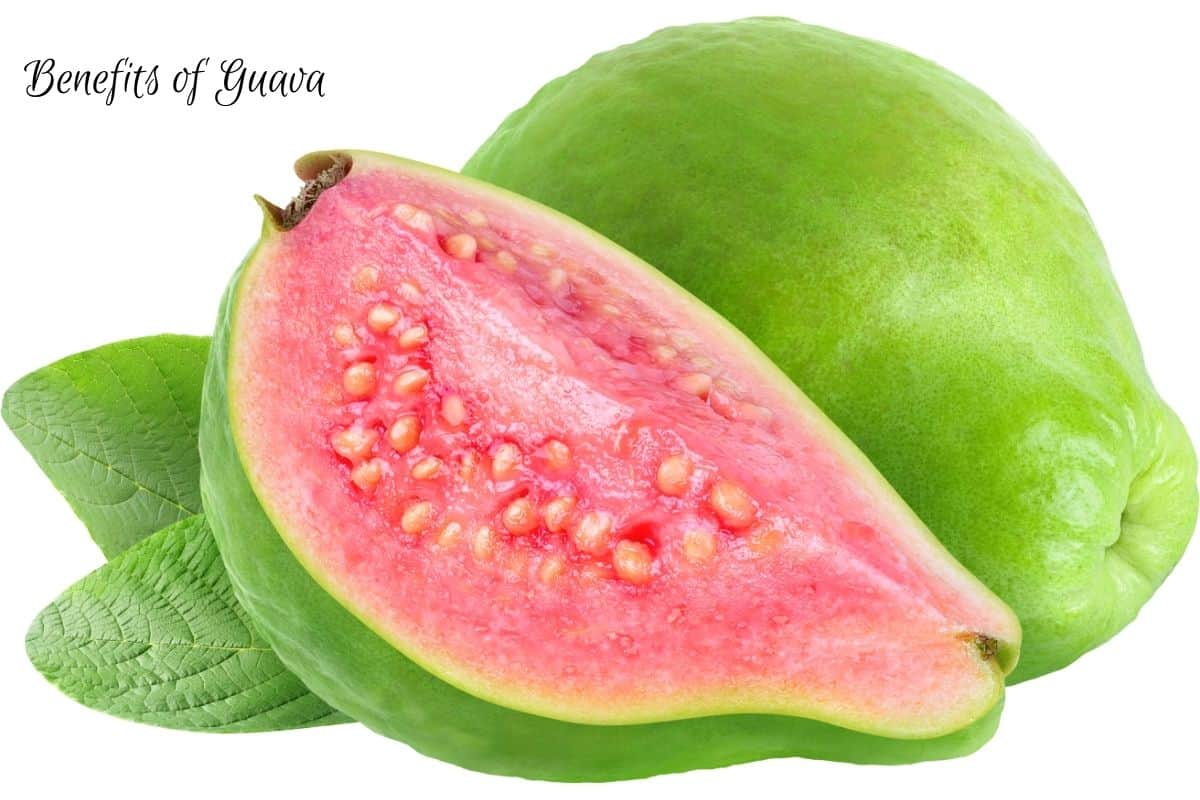
Rich in vitamin E, a fat-soluble vitamin, guava plays an essential role in skin health, guarding against environmental damage.
One of the most compelling aspects of guava is its exceptional vitamin C content. A single guava can provide over 125 mg of vitamin C, approximately 138% of the daily value!
This lot of vitamin C is crucial for the immune system and the formation of collagen, which helps maintain youthful and resilient skin.
But where guava really shines is in its unique antioxidants like quercetin, lutein, lycopene, and cryptoxanthin. These properties are most concentrated in the peel.
Quercetin offers anti-inflammatory and antihistamine properties.
Lutein promotes eye health by defending against free radicals and blue light exposure.
Cryptoxanthin specializes in enhancing lung health with its antioxidant properties.
Lycopene, a potent antioxidant found in red guava, has been shown to reduce the risk of chronic diseases and improve heart health, while also offering protective benefits against certain types of cancer.
Beyond vitamins, guava is also a good source of fiber, making it an excellent choice for regulating blood sugar levels.
Guava leaf extract has also demonstrated the potential to reduce blood sugar spikes, making guava beneficial for diabetes management.
Also, guava contains triterpene constituents that contribute to bone health, a benefit often overlooked but essential for long-term well-being.
Important Warning
While guava leaves are rich in beneficial compounds, they can cause allergic reactions and/or skin irritation in sensitive individuals. Always exercise caution and conduct a patch test if you're considering using guava leaves topically.
What is Papaya?
Papaya, scientifically known as Carica papaya, is another gem in the realm of tropical fruits, originally hailing from Central America.

Often overlooked for its more popular cousins like mango or pineapple, papaya offers a unique blend of nutrients and enzymes that make it a standout choice for health and fruit enthusiasts.
Unlike many fruits, papaya contains an enzyme called papain, which aids in digestion and can break down tough protein fibers.
This makes it a tasty addition to your meal and a digestive aid.
Papain is often extracted and used in supplements containing digestive enzymes as well as meat tenderizers.
Moreover, the seeds of the papaya are edible and have been traditionally used in folk medicine for their anti-parasitic and anti-inflammatory properties.
Papaya is also unique in its maturation process; it can be consumed both ripe and unripe, each stage offering its own set of nutrients and benefits.
Unripe, green papaya is rich in antioxidants and is often used in savory dishes like salads and stews.
So, when looking for a fruit that offers more than just sweetness, consider papaya with its unique enzymes, versatile usage, and rich origin rooted in Central America.
Benefits of Papaya
Papaya isn't just a sweet, tropical treat; it's a wellness powerhouse that offers a wide range of health benefits. One of its most notable components is the enzyme called papain.
This papain enzyme is unique to papaya and serves as a digestive aid, breaking down proteins in the digestive system, making it a great addition to your meals for better digestion.

Beyond digestion, papaya is loaded with essential nutrients like ascorbic acid, also known as Vitamin C along with a variety of B vitamins. Fresh papaya can provide up to 62 mg of ascorbic acid per 100 grams, fulfilling a significant portion of your daily Vitamin C requirements.
These vitamins are important in boosting your immune system and reducing oxidative damage.
Specific antioxidants in papaya include beta-carotene and lycopene. Beta-carotene converts into vitamin A in the body and plays a pivotal role in maintaining healthy vision.
Lycopene, a powerful antioxidant, is proven to lower the risk of cardiovascular diseases and protect against heart attacks.
What sets papaya apart is its potential to regulate high blood pressure. The fiber and potassium in ripe papaya work together to help maintain cardiovascular health, significantly reducing the risk of heart attacks and other cardiovascular diseases.
If you're observing the yellow skin of a ripe papaya, know that the color is indicative of the carotenoid antioxidants present. These not only add vibrancy to the fruit but also offer skin-protective benefits.
Additional Value
While many sources may not mention this, unripe green papaya is also beneficial. It contains higher amounts of papain and is often used in traditional medicine to help skin wounds and even fungal infections.
Comparing Guava and Papaya
Guava and papaya are tropical fruit titans that offer a broad spectrum of health benefits.
Guavas are more round, while papayas are more elongated. While both contribute to improved immunity and better digestion, they do so through different compounds and unique nutrient profiles.
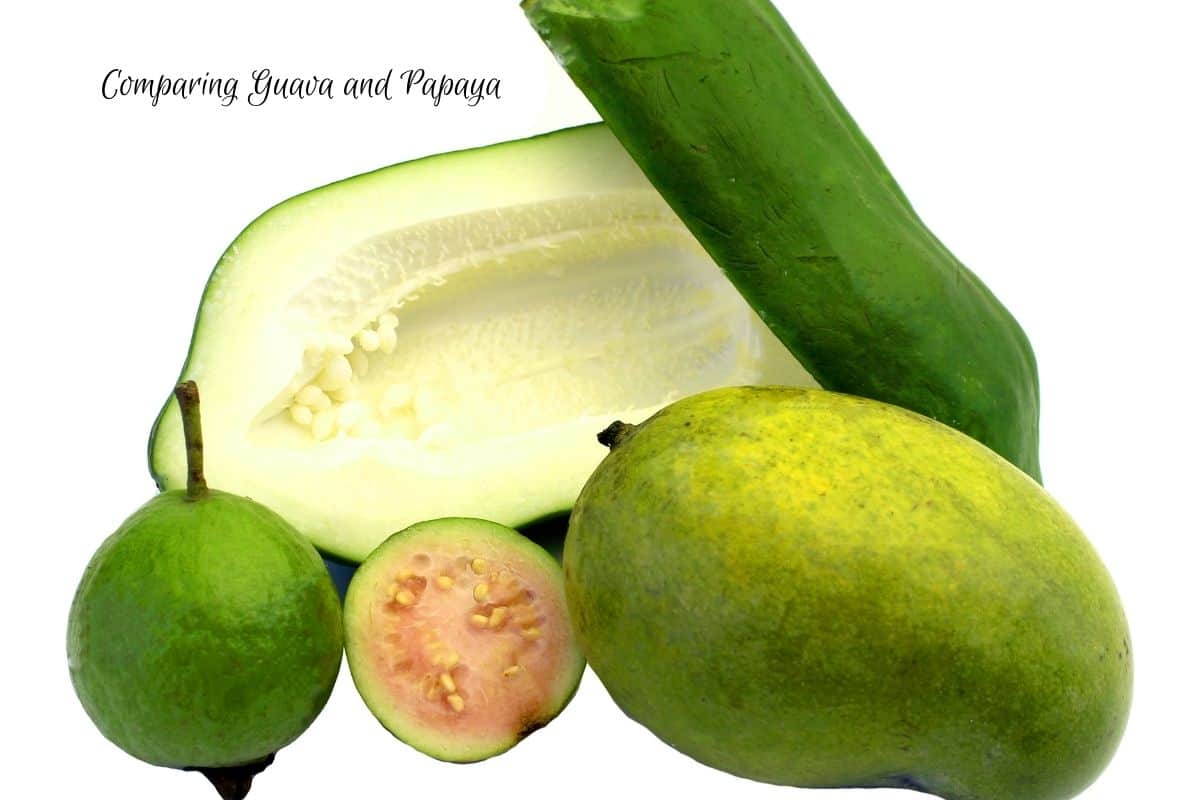
In the Vitamin C department, guava stands out, providing up to 138% of the daily value in just one fruit. Papaya is also a respectable source, offering a substantial amount to support immune health.
For B vitamins, guava often contains higher levels, contributing to various metabolic functions and general wellness.
When it comes to heart health, each fruit has its specialties.
Guava is rich in antioxidants like quercetin and lutein, aimed at reducing the risk of heart attacks and cardiovascular diseases.
Papaya brings powerful antioxidants (carotenoids like lycopene, to the table) recognized for its role in lowering cardiovascular risks.
These antioxidants are more bioavailable in papaya than other fruits and vegetables containing the same phytonutrients.
Guava has an edge with its higher dietary fiber content, making it a go-to for those interested in blood sugar control.
Papaya offers its unique digestive aid through the enzyme papain.
Extra Value
Other beneficial aspects of these fruits are often overlooked. Guava leaves can be brewed into teas for digestive and menstrual relief.
Similarly, papaya seeds, though less commonly consumed, are valued in traditional medicine for their anti-parasitic properties.
Both guava and papaya are commendable choices for bolstering your holistic health. They differ in essential vitamins, unique antioxidants, and other beneficial compounds. Understanding these nuances can help you make an informed choice based on your specific health goals.
Comparison Chart
here's a table for a side-by-side nutritional comparison of guava and papaya per 100g serving:
| Nutrient | Guava | Papaya |
|---|---|---|
| Calories | 68 | 59 |
| Protein (g) | 2.6 | 0.5 |
| Total Fat (g) | 1 | 0.4 |
| Carbohydrates (g) | 14 | 15 |
| Fiber (g) | 5.4 | 1.8 |
| Sugar (g) | 9 | 6 |
| Vitamin C (mg) | 228 | 61.8 |
| Vitamin A (IU) | 624 | 950 |
| Vitamin B6 (mg) | 0.11 | 0.04 |
| Potassium (mg) | 417 | 257 |
| Calcium (mg) | 18 | 24 |
| Magnesium (mg) | 22 | 10 |
| Phosphorus (mg) | 40 | 5 |
These values offer a general idea of the nutritional offerings of each fruit, though they can vary based on factors like ripeness and sourcing.
Ways to Consume Guava and Papaya
Guava and papaya are not just versatile fruits but also culinary chameleons, fitting effortlessly into a variety of dishes and forms. Whether you're looking for a simple, healthy snack or a more complex recipe, these tropical gems have got you covered.
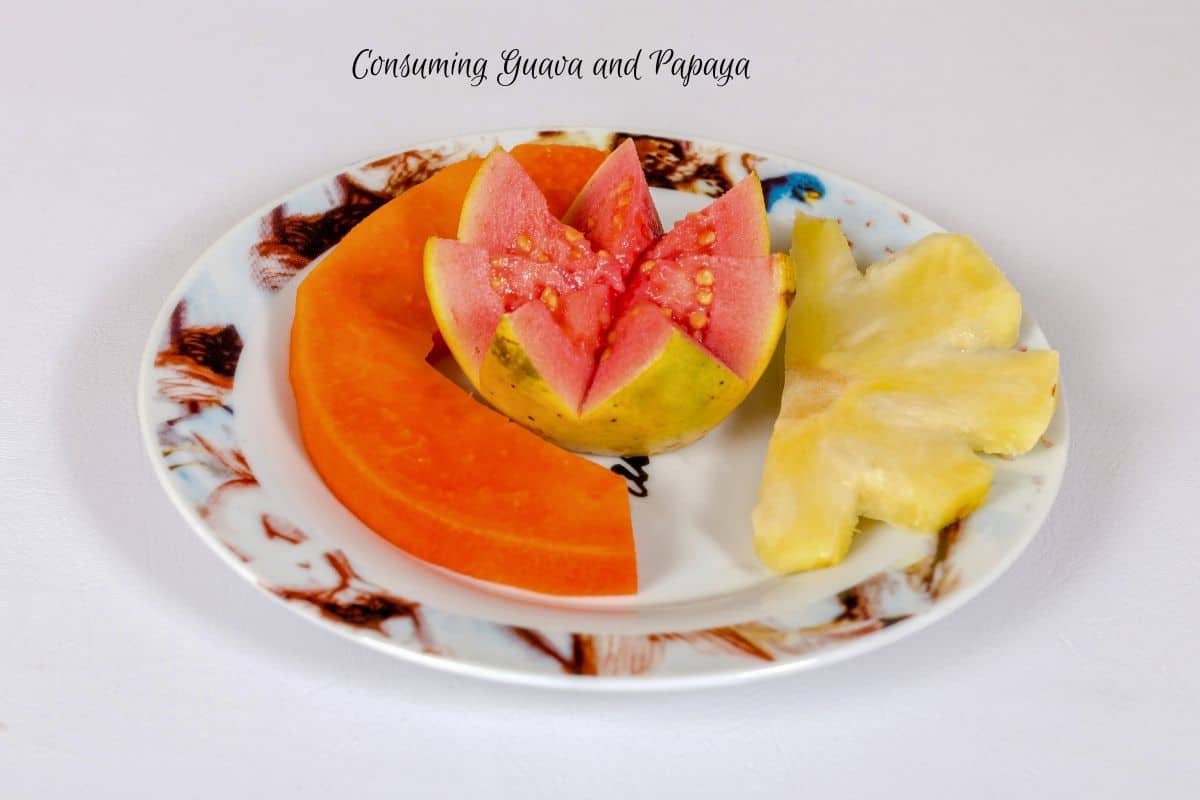
Fresh Guava:
- Raw Slices: Fresh guava can be sliced and eaten raw, seeds and all.
- Guava Smoothies: Blend it with some yogurt and a touch of honey.
- Fruit Salad: Add chunks to a fruit medley for added tropical flavor.
- Juice: Fresh guava juice is both delicious and nutritious.
Fresh Papaya:
- Papaya Cubes: Scoop out the seeds and enjoy the flesh cubed or sliced.
- Papaya Smoothies: Blend with other fruits and perhaps a splash of coconut water.
- Tropical Salad: Combine with mango, pineapple, and a sprinkle of lime juice.
- Juice: Freshly squeezed papaya juice is a morning favorite.
Snacks:
- Guava Cheese: A popular Caribbean treat.
- Papaya Chips: Thin slices of papaya, dehydrated or baked.
- Dried Guava: Available at health food stores, a great snack on the go.
 Craize Guava Crisps | Glute...Shop on Amazon
Craize Guava Crisps | Glute...Shop on Amazon
 Mavuno Harvest Papaya Dried...Shop on Amazon
Mavuno Harvest Papaya Dried...Shop on Amazon
Recipes
- Guava Jelly: Made from guava pulp and juice, it's a spreadable delight.
- Papaya Salsa: A zesty combination of papaya, lime, and spices.
Supplements
- Guava Leaf Extract: Often found in capsules or as a tea for its various health benefits.
- Papaya Enzyme Tablets: Great for digestion, these are derived from the fruit and sometimes its leaves.
 Guava Leaf Extract - Organi...Shop on Amazon
Guava Leaf Extract - Organi...Shop on Amazon
 Organic Papaya Powder, 8oz ...Shop on Amazon
Organic Papaya Powder, 8oz ...Shop on Amazon
From enjoying them as fresh fruits to incorporating them into recipes or taking them as supplements, guava, and papaya offer a plethora of options for anyone looking to enhance their diet and reap their varied health benefits.
FAQ
Guava has around 4 times as much vitamin C and dietary fiber as papaya does. However, both pack a punch with antioxidant content, but papaya contains an incredibly potent digestive enzyme: papain.
Yes! Ripe guava is often compared to the taste and texture of a ripe papaya. However, the flavors differ when they are unripe.
Guava is certainly one of the most nutrient-dense fruits available. With high levels of dietary fiber, vitamin C, vitamin A, and a wealth of antioxidants, guava is certain to give you a large bang for your buck in terms of nutrition.
Conclusion
Guava and papaya are nature's gifts, packed with vitamins, minerals, and unique compounds that elevate your journey toward good health.
Whether you enjoy them fresh, incorporate them into your favorite recipes, or even opt for their supplement forms, these tropical fruits offer something for everyone. For more tropical fruit comparisons, check out dragon fruit vs starfruit, cempedak vs jackfruit, prickly pear vs dragon fruit, and yellow vs red dragon fruit!
We'd love to hear from you! What's your favorite way to enjoy these tropical delights? Is it guava or papaya that wins your heart? Share your thoughts in the comments below.
Don't forget to share this article on social media to help others discover the amazing benefits of guava and papaya. And if you haven't already, sign up for our newsletter for more insightful articles and tips on living a vibrant, healthy lifestyle.
Be well,
Natalie

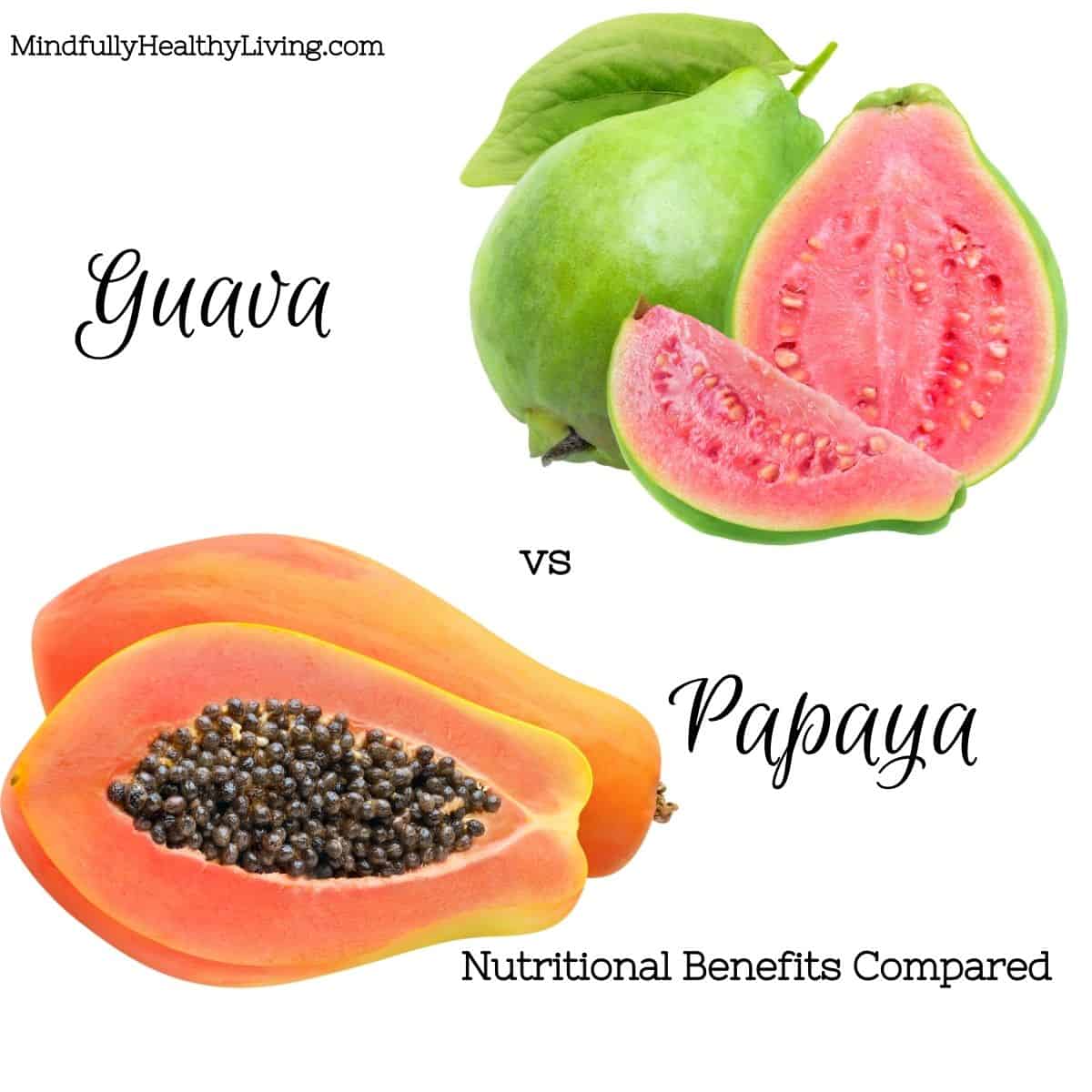
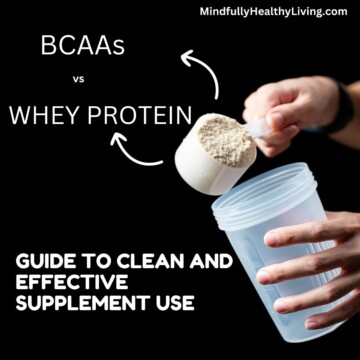
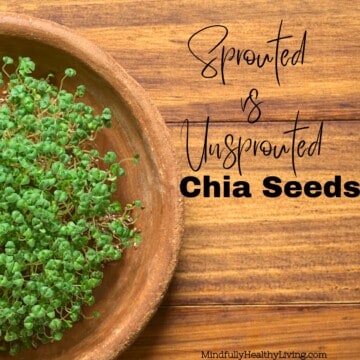
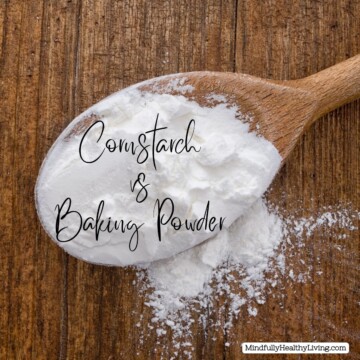
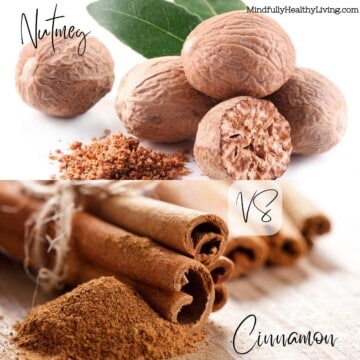
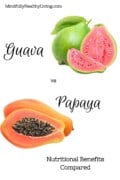


Comments
No Comments